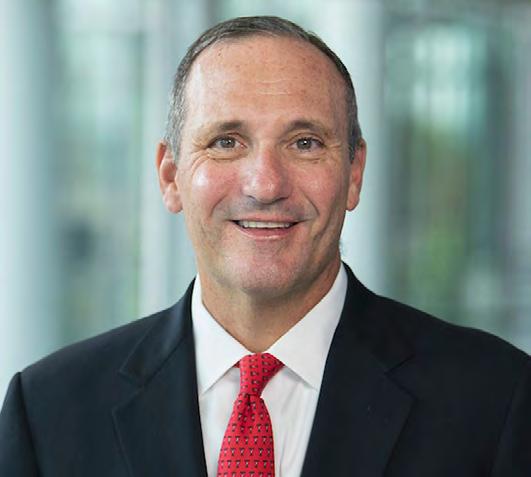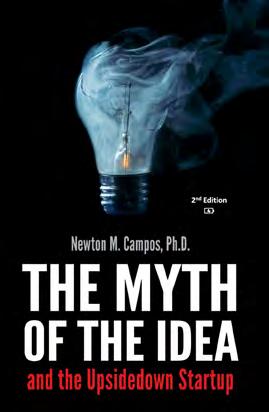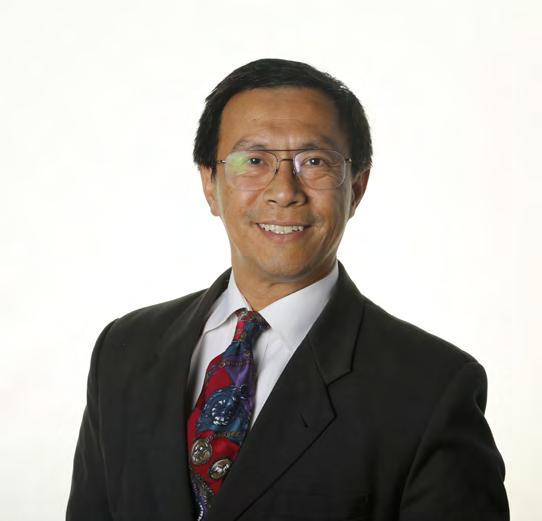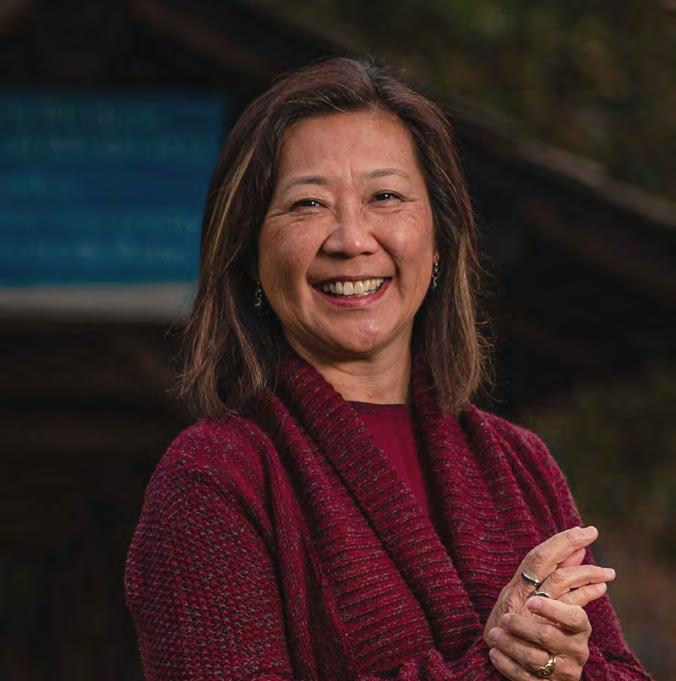KAREN SPENCER
Discover how a multifaceted leader navigates business and inspires others across disciplines. p.06
LT Partners
A.J. WASSERSTEIN
Private investor and Yale professor encourages embracing a holistic approach to entrepreneurship. p08
Entrepreneurial pioneers Eduardo Batista and Thai Nguyen launch the first traditional search fund in Vietnam. p04

ADAM COFFEY
Private equity guru and best-selling author discusses the fundamentals of business success. p10
NEWTON M. CAMPOS
Explore global perspectives and innovative approaches for entrepreneurial success. p12
EXPLORING GLOBAL INSIGHTS INNOVATORS ENTREPRENEURS LEADERS
ISSUE 2
MAY 2023
EYES ON THE HORIZON

horizonsearch.co
SUBSCRIBE
MESSAGE FROM THE EDITOR
CONTENTS
04 LT Partners
A look into the unique challenges and opportunities of ETA in Vietnam and how it can drive responsible investing in the country.
06
Dear Valued Readers,
Welcome to the second issue of my monthly publication, where I continue the pursuit of uncovering the keys to success in entrepreneurship, innovation, and alternative investing. The journey thus far has been nothing short of inspiring, and I am thrilled to share the insights and stories I’ve gathered with you, my dedicated audience.
In this issue, I once again have the honor of featuring pioneers and trailblazers from across the globe, each offering a unique perspective on their respective fields. From visionary entrepreneurs who are shaping the future of technology to innovative investors unearthing new opportunities in alternative markets, these pages are filled with their wisdom, experiences, and lessons learned.
As we embark on this second chapter together, I want to take a moment to express my gratitude for your support. Your enthusiasm and passion have fueled my own, and your feedback has helped shape this publication into what it is today. I hope you find the stories and insights shared within as inspiring and thought-provoking as I do, and may they serve as a catalyst for your own growth and success.
Warmest regards,
David Lovejoy Editor & Chief Content Curator
Karen Spencer
Explore the journey of a trailblazing leader skillfully fostering inclusivity and breaking barriers.
08
A.J. Wasserstein
Learn about 10x10+ entrepreneurship; leaders emphasizing balance, well-being, and ethical practices.
10
Adam Coffey
Military principles drive business success through discipline, teamwork, and servant leadership.
12
Newton M. Campos
Learn about effectuation and why the Japanese concept of onkochishin is attractive to alternative investors.
14
Bao Tran
Artificial intelligence integration in patent applications boosts efficiency, revolutionizing intellectual property protection.
16
Grace McKeown
An expert in the field of change management talks about its evolution and the importance of mentorship for career progression.

18
May Amero
Learn to thrive anywhere by adopting the skills of this successful professional and seasoned global citizen.
HORIZON SEARCH 3

Inthe vibrant and rapidly growing Vietnamese market, Thai and his partner, Eduardo, are two non-traditional searchers who have embarked on the journey of Entrepreneurship through Acquisition (ETA), targeting the acquisition of businesses valued between $5-30 million. While neither partner holds an MBA, they make a compelling enough case as a team that they were able to secure a traditional search fund. This unique approach is set to shape the business landscape in Vietnam and contribute to the country’s sustainable development and responsible investing.
Vietnam’s fast-growing economy, stable currency, and “golden population” make it an ideal location for ETA. With a wealth of mature businesses in need of succession solutions, this approach offers young, ambitious entrepreneurs the opportunity to manage and grow these enterprises. Sectors such as healthcare, education, manufacturing, and B2B services catering to manufacturers present promising investment opportunities in Vietnam.
Collaborating with other search funds in the region, such as those in Japan, has provided valuable insights and experiences. However, each culture and region present unique benefits and challenges. For instance, while the demographic and economic landscape in Japan is well-suited for search funds, Vietnam’s market requires a more tailored approach to secure investor commitments and explain the ETA concept to potential sellers.
To navigate these challenges and capitalize on growth opportunities, Thai and Eduardo plan to build a well-rounded board of directors with a mix of local and international

experience. They also aim to expand their acquisition targets into other sectors, such as furniture, construction, and high-end cutlery. Partnering with vocational schools to train students under the guidance of skilled workers could help secure a steady stream of high-quality labor for the businesses they acquire.
Despite the challenges in fundraising and the skepticism from investors in frontier markets like Vietnam, there is immense potential for growth in this emerging market. The success of ETA in Vietnam will depend on forming strong partnerships, maintaining a clear vision for growth, and integrating Environmental, Social, and Governance (ESG) factors into business operations.
For entrepreneurs considering ETA, it is essential to study the space carefully, leveraging resources like the Stanford Search Fund Primer and connecting with other ETA searchers in emerging markets. By doing so, they can unlock the full potential of ETA in Vietnam and contribute to the country’s sustainable development and responsible investing landscape.
The pioneering efforts of Thai and Eduardo in Vietnam’s search fund space serve as an inspiring example for those looking to enter this promising market. Furthermore, their courageous leap is paving the way for future entrepreneurs to navigate this burgeoning landscape easily. With a vast pool of SMEs, supportive government policies, and ample room for growth, the ETA landscape in Vietnam is ripe with opportunities for entrepreneurs, investors, and the broader economy.
HORIZON SEARCH 5
PIONEERING ACROSS DISCIPLINES
Karen Spencer
Managing Director • Fetch Strategies Co-founder • Searchfunder
As the world becomes increasingly interconnected and diverse, there is a growing demand for leaders who can navigate multiple fields and industries. In a recent interview, I had the pleasure of speaking with Karen Spencer, a trailblazing leader whose diverse educational background in chemical engineering, law, and management has uniquely positioned her for success in various sectors, including acquisition entrepreneurship.

Starting her academic journey at MIT with a degree in chemical engineering, Karen later pursued law at Harvard and finally completed a master’s in management at Stanford. Her distinct academic path was driven by her innate curiosity and desire to explore different industries. She shared her experiences in each field, highlighting the lessons learned and the reasons that led her to transition from one area to another.
Pursuing challenging subjects and heeding general advice for a successful career, Karen initially studied fields that didn’t align well with her professional aspirations. However, she continued to evolve, transitioning from a science-focused education at MIT to a legal education at Harvard, eventually becoming a patent litigator. This role allowed her to spend significant time with innovators and scientists, which she thoroughly enjoyed.
As a female BIPOC leader, Karen candidly discussed the biases and challenges she has faced in her professional jour-
“…it was pretty much the hardest thing you could do at MIT, and I thought that would be a fun challenge…so, while some of my other classmates were not pulling their hair out studying for thermodynamics, that’s what I was doing, studying mass transfer.”
ney, including the cultural differences she encountered and the importance of being aware of the cultural expectations within the American business environment. She believes that professionals of color often grapple with maintaining their authenticity while conforming to these expectations. Through sharing her experiences, Karen hopes to inspire others to break through barriers and pursue their passions across multiple disciplines.
Drawing on her experiences in politics and education, Karen has channeled her exceptional networking skills and entrepreneurial spirit to support acquisition entrepreneurship. She developed and teaches a course on the subject, providing accessible instruction and resources for a more diverse pool of entrepreneurs, particularly those from underrepresented backgrounds.
When asked about advice for those she mentors, Karen emphasized the importance of practice, knowing your audience, and having an entrepreneurial mindset. She also shared her personal strategy for balancing her time, inspired
PIPELINE PREP
2024 Nuts & Bolts (3rd Cohort): This 90-day course comprehensively prepares aspiring entrepreneurs for business acquisition, featuring invaluable sessions, amazing guest speakers, and a diverse cohort, all culminating in a pitch day to investors.
Pipeline Prep/Take Off (One-to-One): An intensive, personalized course featuring 6 one-to-one sessions with Karen, completed at your own pace, which equips you with the skills, network, and tools for successful business acquisition and operation.

Pipeline Prep/Take Off (Self-Directed): Designed to be completed within 60 days, this comprehensive, self-paced course features 9 focused sessions, each providing aspiring entrepreneurs with essential tools, a network, and knowledge to navigate every critical stage of business acquisition and management effectively.
by the book “The Power of Full Engagement,” approaching her day as a series of sprints and incorporating activities that provide spiritual, mental, and emotional fulfillment.
Karen’s experiences in Japan also played a significant role in shaping her values and understanding of cultural differences, including the importance of cherishing each moment. As the world of acquisition entrepreneurship evolves, she believes the community will experience exponential growth and hopes to ensure that it remains diverse, inclusive, and collaborative as it expands.
Karen Spencer’s story serves as a powerful reminder that a diverse educational background and the ability to adapt and learn from different fields can lead to a successful and fulfilling career. And while we celebrate the achievements of pioneering leaders like her, let us also work towards breaking down the biases and barriers that persist in our professional environments, creating a more inclusive and dynamic global community that thrives on the exchange of ideas and experiences.
HORIZON SEARCH 7
“This course was transformative, equipping me with invaluable skills and fostering a network of influential professional connections that are instrumental to my career growth.”
Jahmiah Guillory, Nuts & Bolts (2nd Cohort)
BEYOND PROFITABILITY
A HOLISTIC PERSPECTIVE ON ENTREPRENEURSHIP
 A.J. Wasserstein
Eugene F. Williams, Jr. Lecturer Yale School of Management
A.J. Wasserstein
Eugene F. Williams, Jr. Lecturer Yale School of Management
Acelebrated professor at the Yale School of Management (SOM), A.J. has earned a reputation as a knowledgeable expert in the search fund space, a prolific writer, and a successful entrepreneur. A.J. generously shares his vast experience and knowledge with students worldwide, making him a sought-after mentor. In this article, we explore his insights on entrepreneurship, the 10x10+ designation he bestows upon exceptional entrepreneurs, and the importance of building a life around entrepreneurship rather than just focusing on returns.

The Six Patterns of Entrepreneurship
In one of his popular courses at Yale SOM, A.J. identifies six patterns of entrepreneurship: VC-backed technology companies, family succession, Entrepreneurship Through Acquisition (ETA), franchises, basic copycat models, and cool branded consumer products. While each of these has unique characteristics, some of A.J.’s students are most interested in creating the greatest wealth in the shortest amount of time. Yet, he encourages aspiring entrepreneurs to consider entrepreneurship from a risk-adjusted, lifestyle-adjusted perspective rather than solely focusing on the “returns” metric. To A.J., the essence of entrepreneurship lies in building a complete life and having entrepreneurship fit into the mosaic. Given the high probability of low returns in entrepreneurship, A.J. stresses the importance of evaluating the potential impact on one’s personal life. He urges students to prioritize their well-being and balance as they embark on their entrepreneurial journeys.
10x10+
A.J. defines a unique group of ETA entrepreneurs known as the “10x10+” entrepreneurs. These exceptional individuals have operated a company for at least ten years, significantly longer than the average searcher’s tenure of 3-5 years. Additionally, they must achieve a tenfold increase in their initial capital investment within the first decade, resulting in a remarkable 25% IRR over ten years. This is impressive. The “plus” in 10x10+ signifies entrepreneurs who exhibit compelling leadership characteristics, build ethically, excel in operations and customer service, and maintain a balanced family life. This comprehensive approach to entrepreneurship is demanding but highly rewarding. These are the Hall
of Famers A.J. would have his students aspire to become instead of aiming exclusively for large-scale projects or chasing moonshots. He also notes that entrepreneurs often confuse and mix hobbies and passions with commercially tenable businesses, creating additional obstacles for themselves on their path toward independence.
A Grounded Approach
To illustrate the differences between ETA and startup entrepreneurship, A.J. employs a baseball analogy. Acquisition entrepreneurs would be players who start on first base, while startup entrepreneurs begin in the dugout. ETA entrepreneurs appreciate and understand each step of the journey, clawing their way towards second and third, concentrating on and accumulating singles rather than home runs or grand slams. This realistic approach to entrepreneurship is more secure, recognizing that while risks and variables are present, a total loss is less likely.
Conclusion
A.J.’s insights into entrepreneurship highlight the importance of building a complete life that encompasses entrepreneurship, focusing on balance and well-being, and adopting a grounded, realistic approach to business ventures. His 10x10+ entrepreneurs demonstrate that success in entrepreneurship is not solely determined by financial returns but also by personal growth, ethical practices, and maintaining a life worth living. Aspiring entrepreneurs would benefit from A.J.’s wisdom, striving to create a fulfilling entrepreneurial journey that aligns with their values and priorities.
HORIZON SEARCH 9
FROM SERVICE TO SUCCESS
MILITARY PRINCIPLES GUIDING BUSINESS LEADERSHIP
Intoday’s dynamic business environment, discipline, teamwork, and leadership skills are critical to success. In a recent interview, Private Equity Guru and Best-Selling Author, Adam Coffey, shared insights on how military principles propelled him to excel in the business world.

Adam began his career as a private in the United States Army, highlighting the importance of discipline, teamwork, and leadership in military and business environments. In the military, individuals from diverse backgrounds must collaborate effectively to achieve common goals. Overcoming biases and valuing input from team members leave a lasting impact on those who serve.
This foundation is also vital in business, where Adam refers to it as “servant leadership.” This concept involves leaders prioritizing their team’s needs and involving them in the organization’s vision. Although the military has produced servant leaders for centuries, the business world has only recently adopted this term.
Engineering Expertise and Strategic Planning
Besides his military background, Adam’s engineering skills have been invaluable in his business career. His experience working on classified radar and anti-aircraft missile systems at Redstone Arsenal / NASA’s Marshall Space Flight Center instilled a foundation of meticulous planning and precision, proving crucial in his career. By combining military discipline, engineering expertise, and strategic planning, Adam has tackled the challenges of an ever-evolving business landscape and achieved remarkable success.
Adam Coffey
Private Equity Guru
2x Best-Selling Author
Adam emphasizes the importance of an informal feedback loop, maintaining open communication with employees at all levels. This approach allows for more effective adjustments and ensures everyone in the organization is on the same page. Through years of trial and error, he has developed a strategic approach to driving growth and managing change.
Navigating Industry Transitions and Filling Skill Gaps
When transitioning between industries, Adam underscores the importance of calculated steps. For example, for a C-suite position in a private equity-backed company, he suggests first reaching a certain level in a Fortune 500 company and then making a lateral move within the same industry. This strategy mitigates risks while offering the potential for substantial rewards.


Regarding filling skill gaps in leadership, Adam emphasizes inspiring others over being the most intelligent person in the room. He cites Obama as an example, who successfully inspired millions with hope, despite its intangible nature. Articulating a vision and motivating people can lead to great success. Recognizing one’s skill gaps is also essential. Adam, an operator by nature, acknowledges his need for a vital CFO to provide financial insights and strategic guidance. Leaders can create diverse and influential teams by hiring people to complement their strengths and weaknesses.
Conclusion
Leaders should surround themselves with subject matter experts from various functional areas to avoid groupthink and encourage diverse perspectives. This approach promotes a healthy exchange of ideas and facilitates better decision-making. As a consensus leader, Adam values broadbased input on company issues and works collaboratively with his team to drive success. In conclusion, aspiring executives and entrepreneurs can climb the corporate ladder, build empires, and create lasting legacies in the business world by taking calculated risks, recognizing personal skill gaps, and fostering a diverse and inspiring leadership environment. Watch for Adam’s upcoming 3rd book, Empire Builder, later this fall, where he lays out the strategy for building your own billion-dollar business.
HORIZON SEARCH 11
In today’s rapidly evolving business landscape, entrepreneurs must ebrace cultural diversity and remain adaptable to thrive.
GLOBAL PERSPECTIVES
INNOVATIVE APPROACHES FOR ENTREPRENEURIAL SUCCESS
Newton M. Campos IE University Professor


Byexposing ourselves to different cultures and ideas, we can develop a more balanced and human-centred approach to both our personal and professional lives. This article will explore the power of entrepreneurship and innovation through the unique journey of Prof. Newton M. Campos, whose global experiences have shaped his approach to business. Having lived and worked in Brazil, Australia, Spain, India, France and Western Africa, Newton’s exposure to diverse cultures expanded his understanding of the world and its people.
For example, living in India exposed Newton to the profoundly spiritual nature of the culture and its widespread belief in reincarnation. In contrast, his time in Western Africa made him realize the importance of community and the redefinition of the concept of family. His experiences fostered a higher value on connection and well-being and taught him the importance of openness and adaptability in navigating unfamiliar environments. This mindset combined with his own family business experience in Latin America, led him to practice and research entrepreneurship and innovation, focusing on people-centric development and balancing material, action-based and spiritual aspects of life.
Joseph Schumpeter, often regarded as the father of entrepreneurship, outlined five classic definitions of entrepreneurship: introducing a new product, finding a new way to sell or distribute a product, discovering a new source of raw materials, exploring a new market with an existing product, or reorganizing an industry even through mergers and acquisitions. Analyzing these definitions reveals that innovation is an essential aspect of entrepreneurship. In essence, without innovation, there is no entrepreneurship, and without entrepreneurship, there is no Capitalism. Newton stresses that entrepreneurial success is tied to innovation, and herein lies a challenge — with innovation being the creation of something new and perceived as new by others — this often results in entrepreneurs being ahead of their time, which can lead to failure due to wrong timing, as quite often they are too early in introducing their innovations to society.
Many entrepreneurs begin working on ideas they believe will be significant in the future but often give up too early due to a lack of key resources such as capital, key collaborators or even motivation. Interestingly, most entrepreneurs in history successfully innovate within established, “boring”
businesses rather than launching startups with capital and technology from the beginning. So, small businesses are the most reliable form of innovating in an entrepreneurial way, according to Newton and supported by his scientific research thus far. One key aspect of Newton’s entrepreneurial approach lies in Effectuation, a concept developed by Professor Saras D. Sarasvathy, which posits that successful entrepreneurs grow organically by leveraging existing resources, allowing them to innovate and create new value within their industries. Newton’s focus on effectuation in his book TheMythoftheIdea (2020) led to the acceptance of his bid for a World Bank project, which helped more than 80% of the entrepreneurs he worked with in West Africa succeed. In one of the multiple cases, a chicken coop was transformed into a thriving farm, growing from 3-5 employees to over 100.
Entrepreneurs must constantly adapt, iterate, and explore new business models as the digital economy continues to evolve. The traditional startup model is being scrutinized, now being enriched by more scientifically grounded models such as search funds. This method emphasizes learning from what has already been built and from the experience of others. This concept is encapsulated in a Japanese phrase that is near and dear to Newton’s heart, onkochishin, which can be translated to mean revisiting the past to gain new knowledge and getting a new perspective on things. This is also gaining traction in the private equity world as a more efficient and secure way to establish and grow businesses in an entrepreneurial way.
The search fund model involves locating and acquiring an existing company and leveraging the knowledge and experience of its employees and newcomers to achieve new heights. This approach celebrates the wisdom and expertise already present in the company, often a former family-owned business, resulting in a more efficient path to success. While the search fund model offers a promising alternative to the startup, it’s essential to educate and encourage aspiring entrepreneurs to consider this paradigm shift as an efficient and secure path to success.
In conclusion, by embracing cultural diversity, effectuation, and innovative business models like the search fund model, entrepreneurs can drive sustainable growth while maintaining a delicate balance in an ever-changing world.
HORIZON SEARCH 13
AI + IP
HOW
ARTIFICIAL INTELLIGENCE ENHANCES PATENT APPLICATIONS
Patent Attorney
Founder & CEO PowerPatent, Inc.
Silicon Valley Region Representative
Boston Global Forum
Alternative Investor TVC
Thepatent industry is undergoing a significant transformation as artificial intelligence (AI) technologies become increasingly integrated into the process. In a recent conversation with Bao Tran, an AI patent lawyer, we explored the potential benefits, drawbacks, and future of AI in patent law, offering valuable insights for CEOs interested in this rapidly evolving field.
The Journey to IP Law
Bao’s journey began in engineering, where he started as a technical nerd. However, he soon found himself pivoting toward business when he was encouraged to apply to Columbia Business School. After completing his MBA, he worked as a management consultant for three years before shifting gears again to pursue a law degree.
The decision to study law came after a family health crisis
 Bao Tran
Bao Tran
forced him to move back to Houston, where he enrolled in an evening law program. Although he initially intended to become a corporate lawyer, his technical background led him to the world of patents. He then transitioned from a service provider to a startup environment, creating the Invisalign patent portfolio.
Bao’s experience in both law and business allowed him to support startups in protecting their go-to-market strategies, building IP value, and connecting them with angel and venture investors.
Common Misconceptions About the Patent Process
Many entrepreneurs view the patent process as unnecessarily expensive and time-consuming. However, without protection, startups are vulnerable to being pushed out of the market by larger companies that can adopt their ideas in a phenomenon known as sherlocking. In fact, having a patent application can significantly increase a startup’s valuation, making the investment in IP worthwhile.
The Role of AI in Patent Applications
In today’s fast-paced, innovation-driven world, intellectual property (IP) protection is more important than ever. Bao believes artificial intelligence (AI) can streamline the patent application process.
The advent of generative AI has allowed him to develop a system that creates patent-sounding language, but it requires careful prompting and context to guide the AI effectively. Like a human conversation, AI requires context and guidance to provide accurate output.
By prompting the AI with a title, problem statement, solution, and annotated drawings, Bao has developed a system that can generate accurate and efficient patent applications. By using AI to guide the patent process, the system can dramatically reduce the cost and time required to prepare and file a patent application, and businesses can better protect their innovations and maintain a competitive edge in the market.
As with any technological advancement, it’s essential for professionals in the industry to adapt to the increasing use of AI in their field. Just as calculators and spreadsheets revolutionized certain industries, AI has the potential to make those who embrace it more competitive and efficient. Professionals who refuse to adapt risk becoming obsolete as the industry moves forward.
As AI continues to advance, it’s likely that its role in the patent industry will expand even further. While it’s currently used primarily for document drafting and analysis, future iterations of AI technologies may be able to offer more comprehensive guidance to patent applicants, identifying potential issues and helping to refine their ideas.
The Role of AI in International Intellectual Property
AI has the potential to impact intellectual property on a global scale, as demonstrated by the involvement of AI patent lawyers in organizations like the United Nations Centennial Initiative. By fostering collaboration between thought leaders and promoting a global dialogue, the potential benefits and challenges of AI in patent law can be more effectively addressed.
Conclusion
The powerful convergence of artificial intelligence and intellectual property is ushering in a new era for the patent industry, offering transformative benefits such as unparalleled efficiency and cost reduction.
As AI continues to evolve at a rapid pace, professionals in the field must remain agile and embrace this cutting-edge technology to harness its full potential. By boldly adopting AI advancements and fostering international collaboration, we can navigate potential challenges and create a dynamic environment where innovation flourishes, ultimately driving global progress and success.
The Importance of Adaptability
The invaluable insights from IP expert Bao Tran emphasize the critical importance of adaptability and the pivotal role AI plays in revolutionizing the future of intellectual property protection, opening new doors for businesses and society at large.
HORIZON SEARCH 15
NAVIGATING CHANGE
INSIGHTS FROM A CHANGE MANAGEMENT PROFESSIONAL
Grace McKeown
Principal Consultant
 President
Greater Vancouver Association of Change Management Professionals
Komon Consulting
President
Greater Vancouver Association of Change Management Professionals
Komon Consulting
To explore the intricacies of managing change successfully, I had the privilege of interviewing a seasoned professional in change management. Referring to her experiences, insights, and strategies gained over a successful career, Grace McKeown discusses the evolution of change management and the significance of formalizing it as a profession. After all, change is an inherent aspect of organizational growth and development.
From Paper-Based Records to Digital Transformation
Grace’s career began nearly four decades ago in the healthcare industry. She vividly recounts the early days when health records were entirely paper-based, with index cards and typewriters playing pivotal roles. However, witnessing the gradual transition toward electronic health records profoundly impacted her career trajectory.
The shift from paper to digital records marked a significant turning point in the industry. Grace shares how this transformation brought about efficiency, accessibility, and improved patient care. She also highlights the challenges faced during this transition, such as resistance to change and the need to train staff in utilizing new technologies.
The Influence of Visionary Leaders
During her time in the health care industry, Grace worked under visionary leaders who intuitively understood the importance of change management, even before it had a formal name. Inspired by her mentors, she witnessed successful change initiatives and learned the value of gaining buy-in from stakeholders.
One mentor introduced structured project management into the healthcare sector, emphasizing the significance of engaging people to ensure the successful adoption of new systems. Through these experiences, our interviewee recognized the importance of visionary leadership in driving and facilitating effective change management.
Creating an Integrated Approach
With the formation of the Fraser Health Authority, another mentor was tasked with reducing a substantial deficit. Rec-
ognizing the value of project and change management, they brought together a team to tackle the challenge. This initiative led to the establishment of an internal consulting team specializing in project management, focusing on integrating change management principles.
Grace shares insights into the team’s growth and the development of a structured approach that resonated with clinical professionals. The team successfully navigated complex organizational transitions by combining project management methodologies with a comprehensive understanding of the people side of change.
The Rise of Change Management as a Profession
Grace sheds light on the evolution of change management as a recognized profession by highlighting the establishment of the Association of Change Management Professionals (ACMP) in 2011 and her involvement in the ACMP’s Vancouver chapter, serving in various leadership roles. This professionalization of change management brought about formal standards and certifications, further elevating the field’s importance and impact. Now organizations across industries actively seek dedicated change management roles, recognizing the value of professionals equipped with the knowledge and skills to navigate complex change initiatives successfully.
The Importance of Mentorship and Connecting Generations
Throughout the interview, the theme of mentorship emerges as a significant factor in professional growth. Grace reflects on her mentors and their impact on her career. She emphasizes the importance of seeking mentorship and also becoming a mentor to share knowledge across generations and foster a supportive network.
Grace McKeown’s journey in change management, from the shift of paper-based to digital records to the establishment of change management as a profession, offers invaluable insights into the dynamic nature of change. Moreover, it underscores the importance of visionary leadership, integrated approaches, and the value of mentorship in managing complex organizational transitions.
HORIZON SEARCH 17

May Amero Advisory Committee Member Scale-Up Centre for SMEs Greater Vancouver Board of Trade CFO & Co-Founder San Pareil International Financial Controller MBS Equipment Company
STRATEGIES FOR THRIVING
AS AN IMMIGRANT IN AN UNFAMILIAR ENVIRONMENT
MayAmero is, by all accounts, a successful mid-career professional. She is also a serial immigrant who openly shares her journey of adapting to a new country, culture, and language while discovering, accepting, and simultaneously preserving and evolving her sense of identity. In this article, we will explore the challenges and accomplishments of learning a new language, navigating a new culture, and finding balance in an unfamiliar environment.
May underscores the significance of treating the immigrant journey as an opportunity for personal and professional growth. She recognizes that assuming a leadership role as an immigrant poses unique challenges compared to native-born individuals.
During our conversation, we debated the concept of identity and its varying importance depending on the society in question. To a large extent, May identifies as a global citizen, acknowledging that her identity is a blend of Chinese origin and Canadian experiences. She emphasizes that this fusion extends to the absorption of other cultures encountered in Canada’s multicultural society.
When questioned about the factors that make people averse to change, May attributes it to the fear of the unknown. She shared an example of a former colleague who experienced a certain self-imposed anxiety when interacting with people from different backgrounds, unconscious of her part to play in any given interaction. According to May, the key to overcoming these challenges is fearlessness and letting go of self-limiting barriers.
As the discussion turned toward the importance of personal growth and discovering the requisite inner strength to tackle challenges surrounding acclimation and integration, May found that by demonstrating patience, acceptance, and resilience, one can cultivate personal connections and minimize, if not eliminate, hurdles that may arise due to language or cultural differences.
There is a balance to be struck, however, between preserving one’s heritage and embracing a new culture. This, in May’s experience, is the key to success in finding one’s place in an adoptive country. This process requires adaptability, discovering common ground with the new environment, and making a positive contribution to the surrogate society.
To summarize, for anyone starting anew in a different country or culture, include focusing on language skills or choosing a career path where language barriers won’t hinder your progress. Continuous learning and improvement, building a diverse network, and maintaining a positive mindset are just as essential. Be proactive in seeking out mentors and new connections, as these relationships can open doors and help you grow both personally and professionally.
In conclusion, the experiences and lessons learned by May can serve as valuable guidance for others embarking on their journey in a new country. It’s crucial to remember that everyone faces challenges, but with determination, hard work, and the right approach, success is within reach.
HORIZON SEARCH 19
horizonsearch.co Subscribe Follow Comment info@horizonsearch.co Photo credit linkedin.com/company /horizonsearch/ Inside cover: dell - stock.adobe.com Page 5: Hien Phung - stock.adobe.com THANKS FOR READING!








 A.J. Wasserstein
Eugene F. Williams, Jr. Lecturer Yale School of Management
A.J. Wasserstein
Eugene F. Williams, Jr. Lecturer Yale School of Management






 Bao Tran
Bao Tran
 President
Greater Vancouver Association of Change Management Professionals
Komon Consulting
President
Greater Vancouver Association of Change Management Professionals
Komon Consulting
